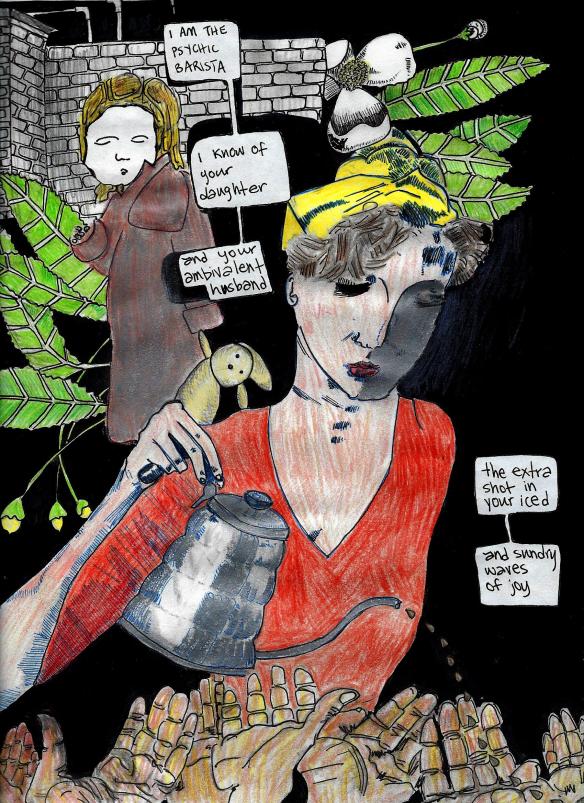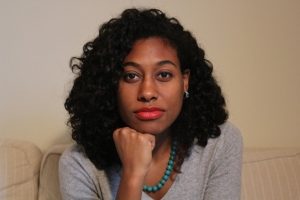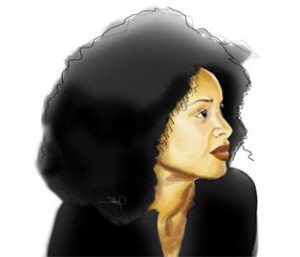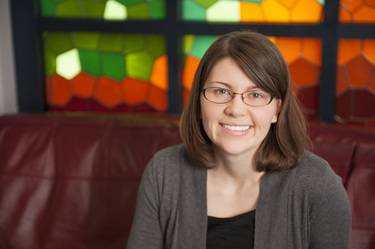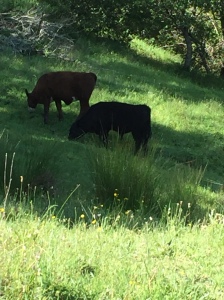The Hustle is a Brooklyn-based reading series that highlights all of the elements that go into sustaining the writing process: from day jobs that pay the bills to mentors and friends who read drafts, to living situations whose rhythms make it possible to retreat into writing. Last week in Bed-Stuy’s Herbert von King Park, MFA Day Job talked with The Hustle organizers Courtney Gillette, Jennilie Brewster, and Anna Marschalk-Burns.
LF: Why don’t we just start from the beginning – tell me what the Hustle is, how it got started, how does it relate to your lives?
JENNILIE BREWSTER: I’m pretty curious to hear if we all have the same recollection of how it started.
COURTNEY GILLETTE: The three of us started meeting as something called Writers Support Group,
JB: But I would even go a step back further. Which is that you and I took a class together, and then you and I started our own writing workshop and basically edited our memoirs for several months, then the three of us linked up into Writer Support Group.
CG: Writer Support group was once a month, we’d get together, usually at Jennilie’s apartment, share what we were working on, and then just sit and work quietly for two hours. So it was like, accountability. I was applying for a fellowship and Anna and Jennilie read my cover letter, and Anna was preparing to do a reading, and we helped her pick something to read – that was how it began. And then – how did we come up with The Hustle?
ANNA MARSCHALK-BURNS: We were talking a lot in general just about how people make a living, our interest in how that happens for people, and I think as we were talking about a reading series – I don’t know if it became, let’s do a reading series and then we came up with a theme, or –
JB: I was interning for [The Renegade Reading Series] at the time, and sort of got to see what it would be to do a reading series, and Anna was like, but let’s do it differently.
CG: Yeah, Brooklyn needed another reading series like a hole in the head, so we were like, how will we start a reading series that offers something besides, ‘here’s six of my friends reading’? At first we came up with two ideas: we were either going to do one that was about process, where writers brought in rough drafts of something they had published, and shared both the rough draft and the finished draft, and we also came up with the idea to do a reading series about day jobs. And then we merged the two things, where we said, what if we did one that talked about process and also about day jobs and how you pay your bills, and what does it mean to you to be a writer, etc.
JB: I personally had a hang-up when it shifted from process to day job, because I was like, wait a minute guys, I don’t have a day job – but I could connect to the idea of “hustle,” and working different jobs at different times. Hustle was the practicals of paying your bills, but also ways of finding time to write, what do you read…
CG: …who has helped you, how do you find mentors, what’s the best advice you’ve gotten. In terms of day jobs, it’s like, I have my MFA, and I have worked in education for the last 14 years. My day job has been as the secretary of a nursery school. And Anna works full time as a teacher – so we had that kind of experience of, what about writers who don’t work in publishing, who don’t freelance, who don’t TA – how does that work?
LF: You’re thinking of ‘the hustle’ as less just the job that you permanently do in order to get by with your writing, and more the whole picture.
CG: The response to people wanting to talk about money – it worked out really well because our first event was in March, and I a few weeks before was when that Salon article, “Sponsored by My Husband,” blew up. On social media I could see all these people being like “yeah, transparency.” Is your husband an engineer, and you’re being supported by them? Do you work for a nonprofit? Are you living off a fellowship? People actually saying I write, but I do it in this way.
LF: People are posting about their accomplishments, and you see when someone’s new book comes out, but you don’t see all the stuff that happened to make that happen.
CG: The babysitting gigs, and their great uncle died and they inherited ten thousand dollars – just the nitty gritty. Some people don’t want to talk about that stuff, and that’s totally fair, but for me it’s been comforting in reminding myself that I can write, and I can pay my bills, these things are not mutually exclusive. Also, a lot of solid writing advice I’ve read over the years has been like, sit and write for six hours a day, six days a week, and I’m like that sounds awesome, but what if you’re working full time? What if you’re writing four hours on a Sunday, and that’s it? One of our first guests, Daniel Jose Older, said “one of the myths we have to break is that you have to write every day.’ If you’re working a lot, you can’t write every day, so write when you can. It was so refreshing to hear him say that.
JA: We’ve had two [Hustle readings] now, and we had Daniel, who writes sort of sci-fi/ fantasy, Ashley Ford who’s an essayist primarily, and Cynthia Cruz, who’s a poet, and we also asked each of the guests to share the best advice they’ve gotten as a writer. For Ashley part of that advice was “don’t let people not pay you for your writing” which was really good for people to hear, and then Cynthia was like ‘I’m a poet, there is no money” and that was good for other people to hear.
LF: How does the fact of living in New York play into these conversations – not getting paid as part of a poet’s life may be a thing one has to accept, and maybe that’s easier to contend with in rural Ohio, say, but in NYC, the cost of living is so much higher.
CG: I think it makes the question even more important. I think about Patti Smith making statements like “you can’t be an artist in New York anymore, you have to move to Detroit.” Because there are so many writers in New York, [the question becomes not just] how do you pay the bills as a writer, but how do you pay the bills as a writer in New York? I do pay attention to people outside of that conversation. One of our guests last month was Stacia Brown, who drove up from Baltimore to read, and she said at one point, you don’t’ have to be in NY to do this writing thing. You can live somewhere with a lower overhead.
JB: That was another good ‘myth buster.’
CG: it’s easy to get stuck in that here. This week was BEA, and all my friends from publishing and I were all going to parties, and I was like this is why I live in New York, because I’m standing on a boat with all these Riverhead people, like Edan Lepucki. but I’m sure if I didn’t live in places where I was invited to a boat with Edan Lepucki I might get more writing done?
AMB: I feel like I sometimes have the opposite feeling about it, where the more that I learn about money in NY, the more I feel completely idiotic for living here. I see this incredible privilege of being able to have experiences like what you’re describing, and being able to know you all – those are things I wouldn’t find in other places, but at the same time, I might be able to not work sixty hours a week. So it’s humbling to think about that, and ask, is this actually what I want to be doing with my life? Maybe not. Maybe not for good.
LF: Have any of you had the experience of working a day job with other people who have another thing going on (roller derby, amateur opera, writing?)
CG: I think you get more of that in New York. I have more friends who are writers and have other day jobs, than I do friends who are just full time writers. I have friends who are booksellers, and work for nonprofits, and have worked in magazines, or…babysitters. At my workplace, there’s one guy who’s a painter and a poet, and my first year we all came back from summer break, and we went around the circle and he was like, yeah, I finished a book of poems, and I was like, what? But this job at the nursery school is the first job I’ve had as a writer where people know that I’m a writer, and that I’m just doing this to make cash. And it’s been really freeing. There is some awkwardness – I’m leaving the school after this year, I’ve been there too long, and we announced that I’m leaving, and all the parents are like ‘where can we read your work? this is so exciting’ and I’m like ‘I write lesbian memoir and explicit sex scenes and lots of stuff about how I’m sober and I used to drink a lot.’ There’s a weird professional line – I’m okay with telling you I’m a writer, but I’m not going to share my website with you. But it has been my first experience where people knew I had another interest outside of the job.
AMB: I don’t have that experience at my job at all. The school I work at is very intense, there’s actually not a lot of time for [another pursuit] so, nobody. Everybody’s like, I’m a teacher, or I’m going to leave teaching to become a lawyer. It’s pretty much on the straight and narrow. The one thing that’s been so great about knowing Courtney and Jennilie, is that when things that are good have happened to me in terms of my writing, and I go to my coworkers who I’m close friends with but don’t’ have any stake in this game, they have no idea how to react to it. It’s like oh, that’s neat –? And I’m like no, this is a big deal! I’ve been working so hard for this. So it’s really nice to have people who know all of the blood, sweat, and tears that gets put into this.
LF: A couple of you have done a number of residencies. What did you take away from residencies that you came back and applied to your more harried writing lives?
CG: My most concrete thing was, my writing studio [at Vermont Studio Center] had this big bulletin board above the desk, and I just collaged it. By the end it was covered with quotes and pictures and magazine clippings and I loved it so much that I was like, why am I not doing this in Brooklyn? So my first week home I took down everything above my desk and did the same thing, so when I make it to my desk now, the first thing I see are these inspiring quotes, and the list of people who backed me to go to Vermont, I still have that – a concrete list of 45 people who absolutely believed in me, I can’t refute it – so that was the most literal translation of this was my writing studio in Vermont, and I just brought it home.
JB: The last couple residencies I’ve done I applied to them as a painter, but the last two I’ve been writing at. They were open to that — it wasn’t about production, it was about time and space to explore.
CG: One of the writers at Vermont was in the metalwork studio every day learning how to make knives.
JB: I definitely had the experience of just really connecting to a different kind of pace. It’s very easy to fill up one’s time in the city with “I’m going to meet this person for coffee.” I think I came back from my residency and it was like, I’m not doing all the coffee dates anymore, I don’t need to catch up with everybody.
CG: All the brunch. I love brunch, but goddamnit.
JB: It’s like, there goes a day! It’s allowing a change — the residencies I did were also all out west, and it’s just spatially different, mountains, desert. It’s like geologic time — I guess I try to bring a little bit of that back in my life. But with New York I find myself constantly renegotiating my internal rhythm with the city’s rhythm. It’s very easy to just get caught up in the current, a current that maybe isn’t so conducive to doing the kind of writing I want to do. So just trying to find the psychic space in the city.
AMB: I’ve never done a residency, but I did have a day job four or five years ago that I quit three months before my contract was up in an attempt to give myself time and space to write, and I did nothing. I watched six seasons of Law and Order. And that really scared me, and since then it’s been a terrifying thought to actually stop working, because I think the best things I’ve written are the things I’ve written at 3 am before they’re due for a class that I’m in, and trying to cram things in in the margins of a really full day is when I’m able to get things done. It’s very hard for me to have a wide-open time frame.
JB: Everything changes.
AMB: I might have more discipline now.
CG: At Vermont, I would leave my phone in my room-room, and when I was at my computer it was just me. But I also napped a ton — I had to accept that that’s what my body needed. Maybe you needed to veg out for three months.
JB: I immediately started thinking about some of the stories I’ve read of Anna’s and how the pacing of Law and Order may have affected her fiction writing.
AMB: That’s a huge compliment.
LF: I like to think about two categories: the things that have ‘happened to you’ as a writer or artist – you get into a program or residency, someone accepts your work – and then there’s a category of things that you feel like you made happen. And sometimes those things overlap: someone couldn’t have accepted you to this thing if you hadn’t put work into it. So since there’s a junction between them, but there’s also the way we feel about those two things. What are some things during the last couple years that you feel have happened to you by a stroke of luck, and things you have pushed through and made happen?
JB: One thing that I feel like really good about is The Hustle. That we have gotten together and that this sort of emerged out of our community, and that’s a cool thing that’s happening. And there was no waiting for someone to give us permission, it was about actually building something.
CG: One of my big ones was I sent a story in 2012 to The Master’s Review…and I was a finalist and then one of 10 stories chosen by A.M. Holmes to be in this volume. I later met A.M. Holmes at the Brooklyn Book Festival, and I was like ‘hi, I’m Courtney, you picked my essay for this thing’ and her face lit up, and she was like, ‘I remember that essay,’ she was like, ‘I look forward to whatever you write.’ She signed my book, and for a couple of months I slept with that book under my pillow, because I was like, A.M. Holmes likes my work. I will float on that for a while. Because my self-confidence plummets every day. Every day it is like me versus self-doubt. And I think for the ‘working hard’ thing, one of my things has been I just have started to freelance. I’ve always sent work to literary magazines and now I’m starting to send to online publications, because you actually hear back quickly and you get paid, which is incredible. I had this essay I had written for modern love, I workshopped it with some people from my MFA program, Jennilie and Anna read it, I sent it to Modern Love, it got rejected. It sat on my desk for a year, I spruced it up and sent it to Buzzfeed, and they were like, yes, love it. And I worked with that editor back and forth for a few weeks to get it into the best shape, and that was one of those moments where I was like ‘I burned this.’ So I think those are my two —
JB: This isn’t something that’s happened yet, but — I’ve been working on a book project for a long time, it’s a text that accompanies a series of paintings that I did. But I just allowed myself in the past couple months to say ‘I’m a writer,’ this is what I’m doing and it goes beyond this book, and I’m gonna write an essay. I’m gonna untether myself from this one project, and explore writing in another form. I sent it to a few people…and then to a couple other people who’ve been kind of like mentors to me, and who’ve both published a lot. I felt like I was asking my friends who are further along in their writing life for permission – like, can I do what you guys are doing? And I really felt like I got the thumbs up for this essay. Two women have both offered me ‘I’ll give you this editor’s email, or I’ll give this editor the heads up that this essay is coming.’ Who knows if that’s gonna play out, but I feel like it does touch on this idea of luck. It’s like I’ve worked five years to be able to write this essay, and it would be really nice if this personal connection happens and it gets noticed and moved out of a pile of a thousand into a smaller pile. Networking is sort of a dirty word, but the reality is you start to make friends who are doing what you’re doing. So I don’t know. I hope that luck works out for me in this one.
LF: Part of luck is others working on your behalf, to some extent.
JB: Another artist told me: it’s your job to be prepared for when luck happens. Have the work ready.
CG: I’ve tried in the last few years to view it not so much as networking but more as kindness. Whether that’s just being gracious at an event, or offering to read something – to be as generous and forthright as you can be. And that I think has gotten me pretty far in terms of people being accepting, and available. That’s become my framework for it.
LF: There’s a poet who wrote an essay about asking an older male writer for advice on getting into a particular journal – and he declined to give her the information she was asking for, like it was an industry secret that he couldn’t tell her. She said that made her want to tell anyone who asked her the secret information that they were asking for. Like, oh, you want the name of that editor who’s not listed on the website? I have it; you can have it. Do you want to know the best way to write a cover letter? I will tell you; I’ve written a successful one. And she considers that a sort of feminist way of spreading information.
JB: I’ve been looking toward women my age or even younger, as opposed to that older dude who’s part of the establishment.
CG: Binder Con has been a huge forum for women and gender non-conforming writers helping other women and gender nonconforming writers. The Binders [Full of Women Writers] Facebook group was started last summer, and Binder Con grew out of that as a physical conference experience that I helped with in NY last fall and it was magic. I remember standing outside of the speed-pitching sessions, where women editors had come to listen to pitches by women and gender nonconforming writers and these women were coming out of the pitch session high five-ing and hugging each other. It was this camaraderie that I think is absent a lot. There have been a lot of awesome dude writers in my corner, but there was something really unique about that experience.
AMB: Both [getting into Brooklyn College, and] my first published fiction, which came out last year, and felt like so much luck to me. Because it was just a slush pile submission.
JB: I guess I was thinking luck more “when the world sort of smiles at you.” That seems to me, your work had to be so great that it stood out — nobody knew to look for your name.
AMB: I guess that’s probably true.
CG: And your part is that you submitted. When we had writers support group…we’d share which journals we were submitting to, and I remember when [Anna] submitted to [The Atlas Review], and finding out months later that you were being published, it felt like a win for all of us. I think that’s especially with submitting to litmags, it’s such a numbers game. Yeah, you’re going to get rejected a lot, but if you don’t submit, there’s no chance.
AMB: I think getting into the MFA program felt really like luck to me. In part because the person who wrote my recommendation letter is a graduate of the program, close to the program director – I’m sure that helped. But also just the way that the program has been so welcoming and kind, it doesn’t possibly feel deserved. It’s like this is the nicest reception I’ve felt in this particular arena in my life, and I’m confused by it. I think it just brings up a lot of feelings of impostor syndrome, but you know, I feel very lucky.
Follow The Hustle on their tumblr and on Twitter @thehustleseries

